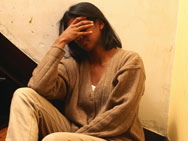|
Sex and the Cancer Patient
Married or single, straight or gay,
cancer patients face special relationship issues
By Marc Lallanilla
Sept. 18, 2008 — A diagnosis of cancer can add a complex new dimension
to the sexual side of human relationships. From the emotional impact of diagnosis to the side effects of treatment, cancer
affects sex in a myriad ways. According to the National Cancer Institute, there are a number of sexuality issues that concern
cancer patients:
- Infertility resulting from treatment
- Erectile dysfunction
- Pain during penetration
- Body image
- Early menopause
- Depression and anxiety
- Loss of interest in sex
"It's important to realize how common sexual problems are after cancer
treatment," says Leslie R. Schover, clinical psychologist and professor of behavioral science at the University of Texas M.D.
Anderson Cancer Center in Houston.
"At least half of [cancer] patients have some kind of sexual problem,"
she says. "They don't tend to go away unless people do something about it."
For more, visit About.com Health
Eating Dirt:
It Might Be Good for You
Experts Claim the Habit of Eating Clay May Be Beneficial
for Pregnant Women
By MARC LALLANILLA

Oct. 3, 2005 — It melts in your mouth like chocolate, says Ruth Anne T. Joiner,
describing her favorite treat.
"The good stuff is real smooth," she adds. "It's just like a piece of candy."
Joiner is describing the delectable taste of dirt — specifically, clay from the region around her home
in Montezuma, Ga.

|
| (Nick Oza/The Telegraph) |
While most people would recoil at the thought of eating mud or clay, some medical experts say it may be beneficial, especially
for pregnant women.
"Every time I get pregnant, I get a craving — I have to eat it," says Joiner, 40, who has given birth to four healthy
babies.
"If I could get just one little bitty piece, that would stop the craving," she says. "It has a fresh, natural-feeling taste,
like the rain or something."
The habit of eating clay, mud or dirt is known as geophagy. Some experts lump it into the same category as pica, which
is the abnormal urge to eat coins, paint, soap or other non-food items.
Cultures worldwide have practiced geophagy for centuries, from the ancient Greeks to Native Americans. In most places the
habit is limited to women, especially women who are pregnant or of childbearing age.
For the full story, go to ABC News

|
| (PhotoDisc) |
The Devastating Impact of Premature Ovarian
Failure
POF Strikes One Woman out of 100 Before Age 40
By MARC LALLANILLA

Jan. 12, 2006 — Like many young couples, Bill
and Molly Arbogast decided to wait before getting married and starting a family.
And after Molly, at age 36, gave birth to a healthy baby boy named Liam in
2002, she assumed she would have no difficulty conceiving again.
But Molly is one of hundreds of thousands of women in the United States who
have been diagnosed with premature ovarian failure, or POF. Like many people, she had never heard of the ailment before.
"My aunt is a medical transcriptionist, and even she said she'd never heard
of it," said Molly, a freelance writer in Baraboo, Wis.
POF remains little known partly because medical researchers are still unsure
of what causes otherwise healthy women to suddenly stop ovulating. In some cases, POF is associated with autoimmune disease
and enzyme or chromosomal defects.
It may also have a genetic component; some women with POF have a family history
of the condition.
For the full story, go to ABC News
|
 |
|
|
|
 |
|
Turn Down the Thermostat
to Burn Fat?
Research links obesity in the U.S. and U.K.
to warmer indoor temperatures

By Marc Lallanilla
January 31, 2011 — A number of factors have been cited for the epidemic of obesity in America
and Great Britain: genetics, food consumption and lack of exercise are all familiar culprits. But British researchers believe
they may have found another cause—warm houses and workplaces.
In their review, the researchers noted that average indoor temperatures during the winter months have increased since
the 1970s in both the U.S. and the U.K.; in the U.S., temperatures have stayed consistently high in the average living room,
and nearly 2 degrees F warmer in bedrooms at night, which is significant.
There are also fewer cold pockets in homes, such as in hallways, leading to less exposure to variable temperatures. At
the same time, workplace temperatures are believed to be increasing.
The researchers blame all of this on a culture of "thermal monotony" brought about by the widespread use of central air
conditioning and heating.
For more, visit HealthCommunities.com
New Bacteria Threaten Public Health
Emerging Strains of Bacteria Are Resistant to Antibiotics

|
| (AP Photo) |
By MARC LALLANILLA

Nov. 9, 2004 — Like
many young athletes, 12-year-old Nicholas Johnson spent last autumn playing football with his local team, the Stafford Spartans
from Stafford, Texas. A minor shoulder injury sent him to the doctor.
Five weeks later, Nicholas left the hospital, lucky to be alive.
"He was like a stroke victim when he came out of the hospital," said Nicholas'
mother, Janet. "He was on a ventilator for 12 days. It was the scariest thing I ever went through."
Nicholas was felled by a deadly new bacterium named MRSA that is sweeping
the United States and Europe.
And medical experts are alarmed that MRSA, or methicillin-resistant Staphylococcus
aureus, is just one of several deadly new strains of bacteria that are becoming resistant to modern antibiotics.
"The development of the MRSA problem is an example of what we're going to
be facing on a regular basis," said Dr. John E. Edwards, professor of medicine at the David Geffen School of Medicine at UCLA
and chief of infectious diseases at Harbor-UCLA Medical Center in Los Angeles.
For the full story, go to ABC News
Research Links Month of Birth to Disease
By MARC LALLANILLA
Feb. 3, 2004 - You may dismiss astrology as a harmless pseudo-science, but your
birthday could have more importance than you think.
Some scientists now believe the month in which you were born may predispose you
to certain illnesses.
Medical experts worldwide have found specific illnesses and behavioral disorders
are more prevalent among people born during certain months or seasons of the year. The list includes asthma, epilepsy, multiple
sclerosis, leukemia, dyslexia, diabetes and others.

Schizophrenia, for example, has been shown to be more common among people born in January, February and March. Narcolepsy,
a sleep disorder, is more frequent among people born in March and less common among those born in September.
So what causes the link between disease and birth month or season? Most scientists suspect environmental factors are the
culprit.
For instance, fetal exposure to seasonal viruses like the flu virus, or to a symptom of viral exposure like fever, might
be a possible cause.
For the full story, go to ABC News
|
 |
|
|
|

